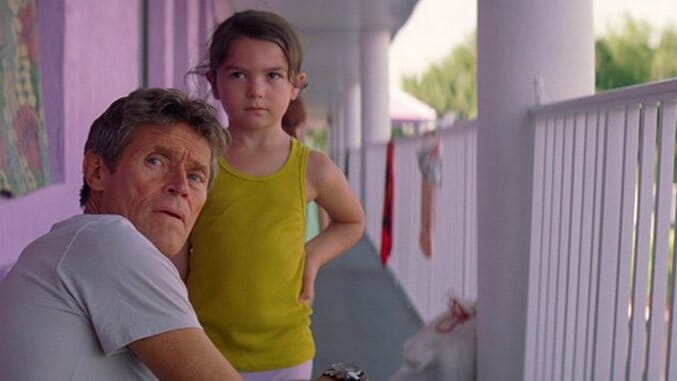In 2013, Sundance was alight with a darkened Disney rumble, catalyzed by a guerrilla-style thriller called Escape from Tomorrow, whose elevator pitch—revealing the darkness that lurks behind the walls of the Happiest Place on Earth—was supposed to reel audiences in. (Its questionable legal status, as it was filmed on Disney theme park property, was perhaps even more of a draw than its alleged strangeness.)
However useful a surreal approach to reframing paradise may be, Sean Baker’s new film, The Florida Project, presents a more acute critique. Baker, in place of surrealism, plunges his audience into his worlds through the lens of social realism, his camera on the same playing field as Moonee (Brooklynn Prince), her mother Halley (Bria Vinaite) and the manager of the motel they live in, Bobby (Willem Dafoe). The camera lives with the characters, watches them haul a bed-bug-infested mattress outside, or sit and eat pancakes by a small creek-ish ditch. Nothing climactic happens in these scenes, we just get to watch and not pass judgment—or pass judgment, whatever, it’s up to us. Baker never interferes; the equality of these scenes under the eye of his camera makes his film’s pointed ideas about survival and joy all the more striking.
At the core of Sean Baker’s filmography (with co-writer Chris Bergoch) is an investment in the humanity of people at the margins of society. There’s a Mike Leigh or Ken Loach feel to his films, like Starlet, which follows a sex worker and her dog, or Tangerine, about two trans women of color and their screwball-toned path of revenge, and now The Florida Project, which focuses on the denizens of a run-down Orlando motel, the Magic Castle, just outside of Disney World. Baker sees much of this fringe world through six-year-old Moonee and her relationships with her best friend Jancey (Valeria Cotto), her single mother Halley and their put-upon quasi-landlord Bobby. Moonee’s ability to cultivate friendships with other kids in the motel is one of The Florida Project’s most impressive feats: She’s raucous and can induct someone like Jancey into her world of wonder, while doling out pieces of wisdom like, “I can always tell when adults are about to cry.” She’s clear-eyed without being cynical, and she brings that out of her peers.
Prince is effortlessly able to demonstrate a sense of interiority to her character few actors several decades her senior could manage. The decrepit world around her is a playground, but she is still self-aware in a startling way. She seems to know she can’t afford the things she wants, a sign that the film does not casually infantilize her or her mother. In other words, their class status matters, clearly, but Baker never presents his characters as stupid or not knowing any better. They are capable of folly, and also of spectacle. Moonee is expressive with her body and her voice: A shout of “you’re not welcome” resonates with piercing comic panache and when she runs through empty parking lots they’re full of liberation and euphoria.
Still, Moonee’s world is unfair and cruel and sets some people up to fail more than others, and the Magic Castle is presented as a less-than-bargain-bin version of whatever Disney World has to offer. Though the rest of the world forgets about or condescends to Halley and Moonee, Baker and cinematographer Alexis Zabe present their exciting adventures in a pastel palette, not just as distractions, but as the means to emotional survival. Rarely does the film seem exploitative, because we see Moonee in her everydayness: In the sweltering heat, Bobby moves a broken ice machine, Moonee dances around abandoned houses, Halley tries to sell perfume to tourists. The Florida Project feels like the quotidian, each small set piece less a plot point and more a subtle gesture or stroke in their lives, its significance neither blown out of proportion nor minimized.
The film may be buoyed with a sense of humor and, occasionally, wonder, but Halley’s life is framed by an internal struggle over whether humor and wonder can help her retain her autonomy at all in spite of her class status. The Florida Project is spattered with profound sadness, with moments of externalized, violent frustration at presumed helplessness, at practically being born into all this. To what degree you believe Baker to be condescending or patronizing or exploitive is up to you, but the film’s bursts of light, its idea of what caregiving looks like when caregiving is a privilege, is handled with sensitivity. When the film switches from 35mm to digital in its final shots, Baker imbues his camera, now mobile, with freewheeling liberation. No matter what happens after The Florida Project ends, in those last moments, these kids are born to live.
Director: Sean Baker
Writers: Sean Baker, Chris Burgoch
Starring: Willem Dafoe, Bria Vinaite, Brooklyn Prince, Valeria Cotto, Christopher Rivera, Caleb landry Jones
Release Date: October 6, 2017
